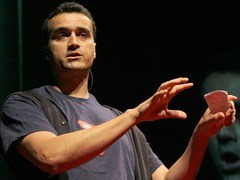The principle behind the art of public diplomacy is not new: in order to advance your goals you need to engage, listen, discuss, persuade and ultimately influence others.
Now, if all this is true, is there a chance for introverts to be good diplomats?
In this TED Susan Cain suggests a very interesting answer.
First of all, she explains what introversion is. She argues that Western culture misunderstands and undervalues the traits and capabilities of introverted people although some of our leaders in history have been introverts: Eleanor Roosevelt, Rosa Parks, and Gandhi.
Nowadays, according to Cain, we entered a new culture that historians call the culture of personality and introverts are pressured to act like extroverts instead of embracing their serious, often quiet and reflective style.
In our workplace when we think to leadership, introverts are routinely passed over for leadership positions, even though introverts tend to be very careful, much less likely to take outsize risks and introverted leaders often deliver better outcomes than extroverts do. Introverts tend to be more empathetic, modest, deep-thinking and innovative.
Cain is not seeking introvert domination but a better balance and inclusion of different work styles, acknowledging that big ideas and great leadership can come from either personality type.

Image source: Flickr – Bill Strain (CC BY 2.0)





Recent Comments